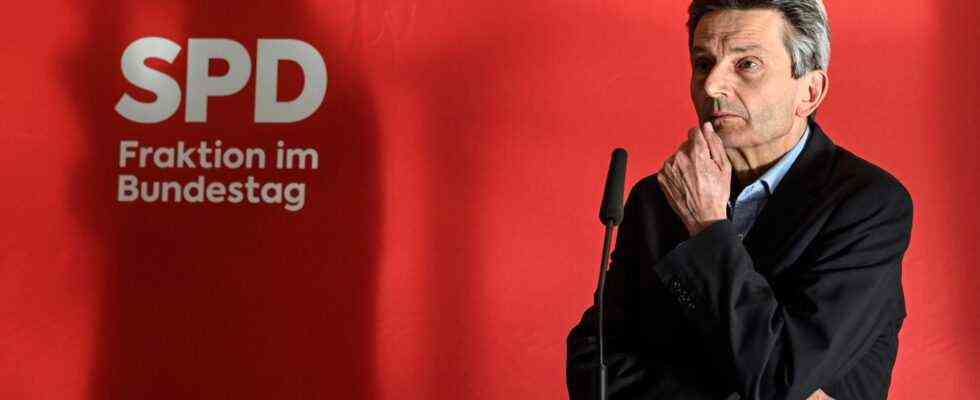Status: 07/24/2021 12:22 p.m.
Quiet and humble in dealing, but also power-conscious if need be: Rolf Mützenich has led the SPD parliamentary group since Andrea Nahles resigned – and he would probably like to continue.
Classic summer reception in Berlin. The prominent political figures drove up: ministers, prime ministers, the top staff of the parties, most of them in black limousines with chauffeurs.
And then someone with a bicycle helmet on his wrist crosses the red carpet. As always, he has probably tied his bike to some kind of lamppost: Rolf Mützenich, parliamentary group leader of the co-ruling party SPD, appears. The words “appearance” and “Mützenich” are a contradiction in terms. The man is so reserved that he could be overlooked or mistaken for a member of the parliament’s office.
That’s how he behaved at first. At every meeting or press conference, Mützenich introduced himself by name and thanked him several times for the interest in his person. He still does that today with thanking.
The polite Mr. Mützenich – here in conversation with Chancellor Merkel in the Bundestag.
Image: dpa
Mützenich is by far the most polite person in the cold-blooded, gruff Berlin political bubble. How does someone like that get into such a powerful position? And are politeness and restraint ideal qualities for a parliamentary group leader?
The party is down
In the case of Mützenich, yes. That is because of the timing. Because when he took over the SPD parliamentary group in mid-2019, the party was down. All the powerful alpha animals have pushed each other out of the way politically, and the parliamentary group also got involved.
Party and parliamentary group leader Andrea Nahles withdrew deeply injured from politics. Her opponent Sigmar Gabriel had already bitten off herself – he is now sitting in the provinces, offended. And the former chancellor candidate Martin Schulz first cheered the party with 100 percent and then put him on the back bench.
At the top of the party, an emergency trio of two prime ministers and the Hessian SPD leader tries to save the federal party from complete implosion. The party is appalled at itself. The situation could hardly be worse.
The senior has to answer
In such an uncertain situation as in the summer of 2019, clear procedural rules help. And the SPD has had enough of that. The senior deputy should lead the orphaned parliamentary group. And that’s Mützenich – who is probably the most surprised himself to suddenly be the first man in the ring.
He manages to calm the group down. Mützenich can listen and moderate. The SPD MPs accept him, probably also because he is the opposite of his predecessor. Spread-legged power is alien to him. This becomes particularly clear when he stands next to his counterpart from the CDU at the parliamentary group level: Ralph Brinkhaus, who pushed Volker Kauder from the group’s top in a kind of putsch and is always good for a loud slogan. Brinkhaus is often in the media – Mützenich remains rather unknown. Some meanwhile also think that it is too quiet, that the SPD should sound louder.
Mützenich surrounded by his colleagues Alexander Dobrindt (left) and Ralph Brinkhaus (right).
Image: dpa
This leads to the fact that he is occasionally underestimated by some old men in his faction. A mistake, as Johannes Kahrs found out, among others. Kahrs wanted to become a military representative – and as the head of the powerful Seeheimer in the SPD and chief puller, he was also very sure of his cause. But Mützenich lets him off. He pushes his candidate Eva Högl through, Kahrs leaves the Bundestag. Mützenich can also be a power politician and show a clear edge.
In Bundestag speeches, the parliamentary group leader always moves the party to the left – and thus offends some party friends and the coalition partner. Foreign and peace policy is Mützenich’s big topic. He vehemently rejects armed drones for the Bundeswehr, calls for the withdrawal of US nuclear weapons from Germany and is against NATO’s two percent target for defense spending.
Mützenich has created peace in the parliamentary group – she has seldom been as calm as she is now. Is this quiet but clear leadership a model for the future? Mützenich would like to continue. He likes to be a parliamentary group leader. But as a humble person, all he says is that he would just like to move back into the Bundestag. As the top candidate of the SPD in North Rhine-Westphalia, the chances are good.
He does not decide whether Mützenich can stay at the head of the parliamentary group. The prospects for him are probably also mediocre. Should the SPD go into the opposition in the fall, the post of parliamentary group leader in the Bundestag would be the only powerful position that could be assigned. It is quite possible that the hapless candidate for Chancellor Scholz will then claim it for himself.

